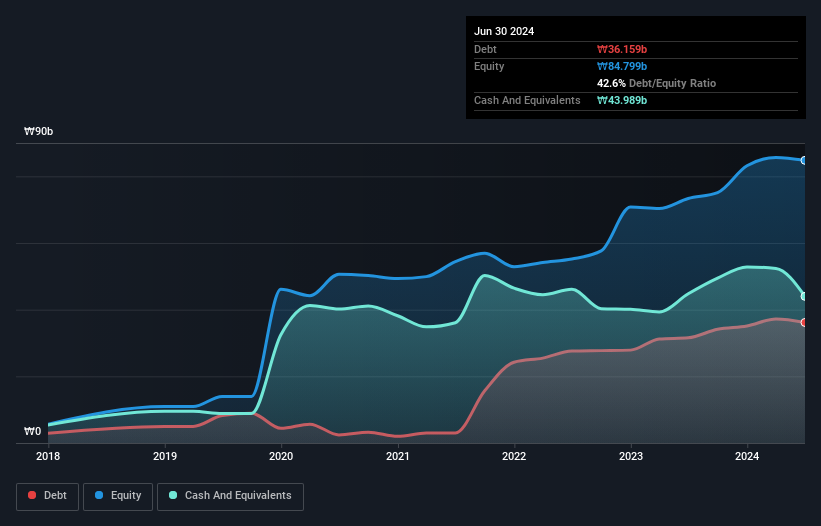Some say volatility, rather than debt, is the best way to think about risk as an investor, but Warren Buffett famously said that 'Volatility is far from synonymous with risk.' So it might be obvious that you need to consider debt, when you think about how risky any given stock is, because too much debt can sink a company. We note that ATON Inc. (KOSDAQ:158430) does have debt on its balance sheet. But should shareholders be worried about its use of debt?
Why Does Debt Bring Risk?
Debt assists a business until the business has trouble paying it off, either with new capital or with free cash flow. Part and parcel of capitalism is the process of 'creative destruction' where failed businesses are mercilessly liquidated by their bankers. However, a more usual (but still expensive) situation is where a company must dilute shareholders at a cheap share price simply to get debt under control. Of course, plenty of companies use debt to fund growth, without any negative consequences. The first step when considering a company's debt levels is to consider its cash and debt together.
View our latest analysis for ATON
How Much Debt Does ATON Carry?
The image below, which you can click on for greater detail, shows that at June 2024 ATON had debt of ₩36.2b, up from ₩31.6b in one year. But on the other hand it also has ₩44.0b in cash, leading to a ₩7.83b net cash position.

How Healthy Is ATON's Balance Sheet?
According to the last reported balance sheet, ATON had liabilities of ₩52.8b due within 12 months, and liabilities of ₩8.67b due beyond 12 months. Offsetting this, it had ₩44.0b in cash and ₩19.5b in receivables that were due within 12 months. So it can boast ₩2.04b more liquid assets than total liabilities.
This surplus suggests that ATON has a conservative balance sheet, and could probably eliminate its debt without much difficulty. Simply put, the fact that ATON has more cash than debt is arguably a good indication that it can manage its debt safely.
On top of that, ATON grew its EBIT by 54% over the last twelve months, and that growth will make it easier to handle its debt. There's no doubt that we learn most about debt from the balance sheet. But it is future earnings, more than anything, that will determine ATON's ability to maintain a healthy balance sheet going forward. So if you want to see what the professionals think, you might find this free report on analyst profit forecasts to be interesting.
Finally, a business needs free cash flow to pay off debt; accounting profits just don't cut it. ATON may have net cash on the balance sheet, but it is still interesting to look at how well the business converts its earnings before interest and tax (EBIT) to free cash flow, because that will influence both its need for, and its capacity to manage debt. During the last three years, ATON produced sturdy free cash flow equating to 76% of its EBIT, about what we'd expect. This cold hard cash means it can reduce its debt when it wants to.
Summing Up
While it is always sensible to investigate a company's debt, in this case ATON has ₩7.83b in net cash and a decent-looking balance sheet. And it impressed us with its EBIT growth of 54% over the last year. So is ATON's debt a risk? It doesn't seem so to us. The balance sheet is clearly the area to focus on when you are analysing debt. However, not all investment risk resides within the balance sheet - far from it. Case in point: We've spotted 3 warning signs for ATON you should be aware of.
At the end of the day, it's often better to focus on companies that are free from net debt. You can access our special list of such companies (all with a track record of profit growth). It's free.
New: Manage All Your Stock Portfolios in One Place
We've created the ultimate portfolio companion for stock investors, and it's free.
• Connect an unlimited number of Portfolios and see your total in one currency
• Be alerted to new Warning Signs or Risks via email or mobile
• Track the Fair Value of your stocks
Have feedback on this article? Concerned about the content? Get in touch with us directly. Alternatively, email editorial-team (at) simplywallst.com.
This article by Simply Wall St is general in nature. We provide commentary based on historical data and analyst forecasts only using an unbiased methodology and our articles are not intended to be financial advice. It does not constitute a recommendation to buy or sell any stock, and does not take account of your objectives, or your financial situation. We aim to bring you long-term focused analysis driven by fundamental data. Note that our analysis may not factor in the latest price-sensitive company announcements or qualitative material. Simply Wall St has no position in any stocks mentioned.
About KOSDAQ:A158430
ATON
Engages in the provision and operation of mobile financial solutions, content, and financial services in South Korea.
Excellent balance sheet with questionable track record.
Market Insights
Community Narratives



